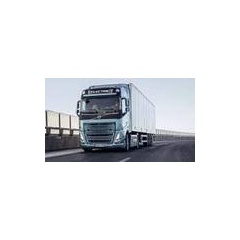The electric truck accelerating our drive towards zero emissions
Unilever is piloting a new heavy-duty truck that’s powered purely by renewable electricity – and we’re committing to switch to many more.
Unilever has added one of the world’s first heavy-duty electric trucks to our fleet, marking an important milestone in our move towards zero emission vehicles.
The 44-tonne Volvo truck, which will run entirely on renewable power, is the first heavy-duty electric vehicle with sufficient range to meet our business need of transporting goods from our distribution centres to retail customers – and the first such vehicle to hit the road in the Netherlands.
The truck has a 540 kWh battery capacity, which is equal to more than seven average electric passenger cars, and it can travel up to 185 miles on a single charge.
‘Greening’ our journeysTo help reach our value chain goal of net zero by 2039, we’ve identified measures which we believe will help cut greenhouse gas emissions from our logistics network by 40–50% by 2030. Switching to electric vehicles where we can is a core part of that.
Our logistics sustainability strategy has two key objectives. One is reducing the distances we need to drive in our distribution. The other is ‘greening’ the miles we can’t avoid driving – and that’s where the new truck will be a game-changer.
When charged with green, renewable electricity at our distribution centre, it’s a zero-emission vehicle, reducing up to 100 tonnes of carbon per year compared to a regular diesel truck. And there are other benefits too. Not only is the electric truck far less polluting, it’s also much quieter than a diesel-powered vehicle – good for the environment and for drivers’ working conditions.
Did you know?To achieve the objectives of the Paris Agreement, all new trucks sold in the world’s major markets must be zero emission by 2040
This truck won’t get far on an empty battery, so we’ve invested in setting up high-power charging infrastructure at our Tiel distribution centre in the Netherlands, ensuring we can keep the vehicle’s electric battery topped up and charge more trucks that we plan to add to our fleet in the future. Adding charging facilities at existing sites is a challenge, impacted by both warehouse design and grid capacity, but we’re working on it and are learning a lot from this project. Any new warehouses we open in the future will need to include electric vehicle charging as standard.
“Electrification of our transport and distribution activities is at the heart of Unilever’s logistics sustainability strategy. This launch represents a significant step forward in putting that strategy into action and marks a milestone towards more and more electrification in Europe,” says Michelle Grose, Unilever Head of Global Logistics.
“We’re delighted to be one of the first companies to use this new truck, and to be working with our trusted transport partners Kuehne+Nagel and Simon Loos as we start this journey,” she adds.
“We are excited about this partnership,” says Anna Müller, SVP, Europe North & Central at Volvo Trucks. “Starting with the introduction of the very first heavy electric truck in Unilever’s transport system will provide valuable insights and constitutes a great basis for an extended collaboration in the future.”
Boosting demand for electric trucksBack in 2017, Unilever became the first fast-moving consumer goods organisation to join The Climate Group’s EV100 initiative, which brings together companies committed to switching to electric vehicles by 2030.
As one of ten founding members of EV100, we pledged to transition to electric vehicles across the fleets that we own or lease by 2030. More than 120 companies have since joined, agreeing to the same goal.
Now we’re proud to be one of five founding businesses joining the launch of EV100+. This new collaborative group comprises companies who aim to phase out the heaviest and most polluting vehicles on the roads. Because while we’ve committed to transitioning more of our transport to electric vehicles, we can only do so if there are suitable alternatives on the market.
Together with IKEA, JSW Steel, Maersk and DPD, we have committed to transition our fleet of vehicles over 7.5 tonnes (known as medium- and heavy-duty vehicles or MHDVs) to zero emissions vehicles by 2040 across 38 OECD markets as well as China and India. The EV100+ members will also help to send a clear signal to vehicle manufacturers and policy-makers that business demand for zero emissions MHDVs is growing fast.
Did you know?MHDVs represent 4% of vehicles globally but account for 40% of all road transport emissions and a third of total transport fuel use
“Businesses are willing to lead”“MHDVs represent the final frontier of zero emission road transportation, and EV100+ will tackle the heaviest, most polluting vehicles across the world,” says Sandra Roling, Director of Transport at the Climate Group.
“We have seen over the last five years how EV100 has acted as a powerful catalyst for change across light-duty vehicle fleets. Now it’s time for EV100+ to drive this change across global MHDV fleets as well. We know the technology is ready, and businesses are willing to lead.”
( Press Release Image: https://photos.webwire.com/prmedia/6/294830/294830-1.jpg )
WebWireID294830
This news content was configured by WebWire editorial staff. Linking is permitted.
News Release Distribution and Press Release Distribution Services Provided by WebWire.
